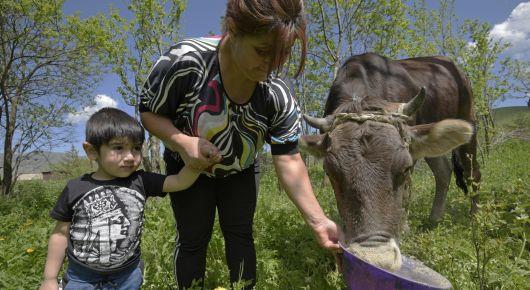FAO, OIE and WHO call for stronger coordination in mitigating health threats

In a joint statement released today, FAO, the World Organization for Animal Health (OIE), and the World Health Organization (WHO), committed to strengthening multi-sectoral coordination and efforts to combat health threats associated with interactions between humans, animals, and the environment across Europe and Central Asia.
This message was reiterated in a virtual event of the regional Tripartite members represented by Vladimir Rakhmanin, FAO Assistant Director-General and Regional Representative, Budimir Plavsic, OIE Regional Representative for Europe, and Hans Henri P. Kluge, WHO Regional Director for Europe.
They committed to establishing and supporting a regional coordination mechanism for the One Health approach to foster its implementation at both the executive leadership and technical expert levels.
As part of the regional coordination mechanism, the Tripartite will also establish a Regional One Health Partner Platform that will bring together policy makers, partners, and experts to provide strategic advice and foster the implementation of the One Health agenda in Europe and Central Asia.
“The sudden outbreak and amplitude of the current COVID-19 pandemic, a human health crisis potentially caused by a virus passed down from animals, highlights the need for coordinated action across sectors to protect health and prevent food systems disruptions,” said Vladimir Rakhmanin, FAO Assistant Director-General and Regional Representative.
Hans Henri P. Kluge, WHO Regional Director for Europe, welcomed the formation of the Tripartite, saying: “The Tripartite has long recognized One Health as 'the way of working' to address various health issues originating in the animal, human, and environment interface. WHO does not take its role and contribution to One Health lightly. However, despite years of collaboration within the Tripartite and with regional partners, we can do better.”
“That is why we warmly welcome the formation of the One Health Coordination Mechanism for Europe and Central Asia. The Mechanism will allow us to engage with Member States at a political and technical level, providing a platform to convene international and national stakeholders to jointly view needs and challenges through a One Health lens – and collectively mount a response to avoid duplicating efforts and wasting resources."
“Today we want to send a strong message on our commitment to implement our joint One Health vision throughout the whole region, of its 53 Member Countries, with their national health systems engaged in multi-sectoral partnerships and capable of preventing, detecting, containing, and eliminating animal and public health risks with zoonotic potential and huge impact on food security and overall stability,” said Budimir Plavsic, OIE Regional Representative. He added that the regional One Health Mechanism, established today, will facilitate functional collaborations with other partners and increase capacities for prevention and control, not only for the current SARS-Cov-2 pandemic and antimicrobial resistance (AMR), but also for those health threats which will come from spillover events at the animal-human-environment interface.
One Health is an integrated global initiative for ensuring a holistic approach to tackle health threats to animals, humans, plants, and their shared environment.
The regional coordination mechanism was established to identify the regional One Health priorities, facilitate operationalization of activities in those areas, and support joint engagements and partnerships at the animal-human-environment interface for coordinated support to countries and maximized country impact.
The involvement of all relevant decision makers and experts of the Tripartite organizations, combined with the Partner Platform, will ensure a strong, high-level coordination of support and political profile across One Health areas, combined with a dedicated, synchronized technical delivery in countries.
Zoonotic diseases with pandemic potential, foodborne diseases, and endemic zoonosis, such as rabies and brucellosis, are causing many infections and deaths across the globe while, at the same time, incurring serious socio-economic implications.
The current pandemic, as well as the continuous emergence of health threats originating in the animal, human, and environment interface, urges the three organizations to reassess, renew, and increase assistance to countries to prevent, detect, assess, and manage potential health threats with the aim of protecting health, avoiding economic disruptions, and sustaining livelihoods.
In the joint statement, the Tripartite in Europe and Central Asia acknowledges the importance of close collaboration and communication among all sectors responsible for health under the One Health approach. The approach is particularly relevant to address health issues associated with AMR, zoonotic diseases, food safety, and health security.
23 April 2021, Budapest, Hungary
